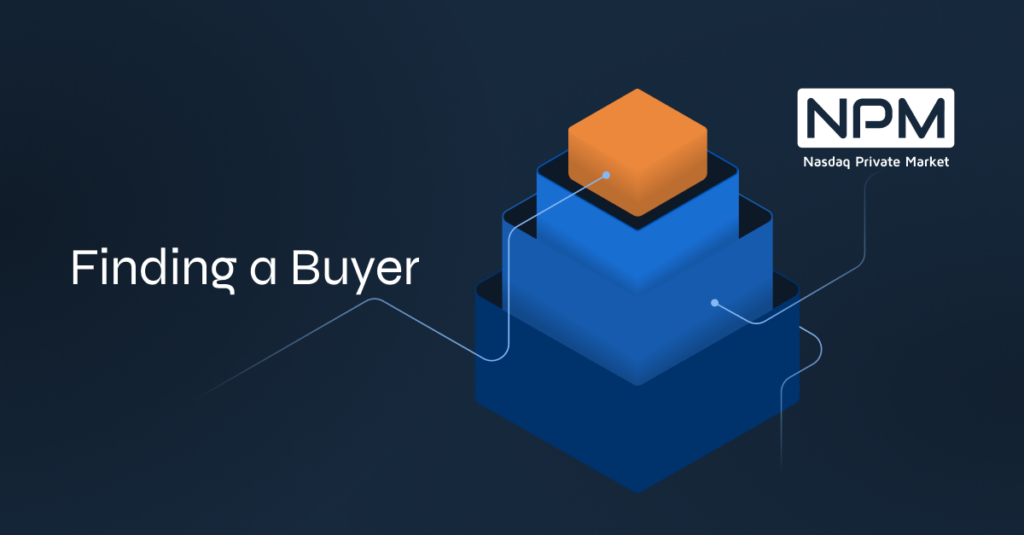Introduction to Selling Private Company Shares
Understanding the market is essential when attempting to sell private company shares. Selling private company shares requires a basic understanding of the space as well as the venues and providers available to help individuals transact. While selling shares of public company stock on an exchange is typically a straightforward transaction, selling private company stock is not as straightforward. For instance, finding a qualified buyer can be difficult.
Overview of the Process
Selling shares of a private company involves a structured process to ensure a smooth transaction. The first step is to sign up for an account on a trading platform like SecondMarket™ from Nasdaq Private Market (NPM), a platform specializing in facilitating the buying and selling of private company stock. After setting up an account and onboarding to the platform, you can post an offer to sell your shares. This process involves listing the number of shares you want to sell and your desired price. You will also be asked to upload proof of ownership documents related to your shares.
Determining the right price for your shares requires an understanding of both the company’s valuation and market sentiment. Before selling, it is important to do some basic market research, including understanding recent company transactions, industry trends, and, to the extent possible and available, reviewing the company’s recent financial information. Using tools like NPM pricing data can help you estimate and set a competitive and realistic price.
The Role of NPM in Finding Buyers for Private Company Shares
NPM capital markets specialists help facilitate connections between sellers and buyers of private company stock.
As an established industry leader, NPM provides a marketplace where shareholders can post their private company stock and potentially connect with many active, institutional buyers. SecondMarket, the web-based liquidity platform from NPM, facilitates the entire trade process, and gives sellers transparency throughout the lifecycle of the trades, from posting their shares, through matching with a buyer, to settling and transferring funds and shares. The platform supports sellers as they navigate the share sale and manages the company approval process, which is a key feature of the private secondary market. Moreover, SecondMarket provides market and pricing data to gauge buyer demand and sentiment.
Benefits of Using NPM for Private Share Transactions
One of the key benefits delivered by NPM is that it connects sellers with a global network of buyers. The transaction process is also made more efficient by NPM’s digital tools, leading to streamlined execution of the sale, from initial trade posting through settlement.
Another major advantage is that the platform provides valuation data, which helps inform sellers about the value of their shares so they can decide how and when to put their shares up for sale, and at what price. Furthermore, SecondMarket’s transparent fee structure for private stock transactions typically results in higher net proceeds to the seller compared to other trading venues. NPM charges sellers a low, flat 1% commission, a fraction of what is charged by other platforms, which typically charge 5% or more.
Traditional Methods for Finding Buyers Before Nasdaq Private Market
Prior to modern trading platforms, sellers would use personal networks, financial intermediaries, and brokers to find buyers for private company shares. Often sellers turn to other current shareholders, the company’s management team, or business associates to sell shares directly. Another approach is hiring investment banks or brokers with a specialization in private market transactions to locate possible buyers. Sellers also participate in company-sponsored tenders or auctions, where several buyers are invited to bid on shares, a service that NPM also provides to private companies. Employee stock ownership plans (ESOPs) are also an alternative. ESOP transactions entail a process in which employees can gradually acquire firm stock from the company itself.
Pros & Cons of Traditional Methods
While many of these approaches have been tested over time, traditional means of identifying buyers have advantages and disadvantages. Advantages of selling directly to known individuals or institutions is that the news of the sale is often spread through word-of-mouth, in which interest can be piqued and discussion can happen quickly and organically. Involving financial intermediaries such as brokers and investment banks is also generally seen as a positive approach because it provides access to their transaction expertise, as well as a wider network of qualified individuals that may secure lucrative terms for the seller.
However, there are some disadvantages associated with legacy methods. Hiring intermediaries, for instance, often requires higher fees. Furthermore, without a marketplace platform the due diligence process and negotiations could take a lot longer, delaying the sale and making it more complex.
Strategies for Attracting Potential Buyers
Leveraging NPM Technology and Expertise
Attracting potential investors or buyers for your shares is made easy through NPM’s resources and expansive network. Sellers can market their shares to a vast, diverse network of active investors using digital infrastructure provided by NPM. The platform offers access to methods for better communication with potential purchasers and helps manage the transaction process on behalf of sellers.
Best Practices for a Successful Sale
Tips for Negotiating with Potential Buyers
Negotiating with potential buyers is a critical step in selling private company shares, and preparation is key to achieving a successful outcome. While it’s important to know the estimated value of shares, being flexible and open to negotiation can help close deals with interested buyers.
Managing Tax Implications and Financial Planning
Selling shares of a private company can have tax implications that require careful planning. An initial consultation with a certified tax adviser will enable the seller to understand their tax obligations and to discuss strategies for mitigating tax leakage. Additionally, it is crucial for sellers to think about how the sale proceeds fit into their larger financial plan, which could include retirement and estate planning.
Ensuring a Smooth Transaction with NPM’s Support
NPM support is valuable for ensuring a smooth transaction. Sellers can utilize the platform’s resources, including its digital tools, market data, and transaction support, to manage the sale process effectively. NPM tools can help sellers to make more informed decisions throughout the sale process and help sellers seamlessly negotiate with buyers from end to end.



